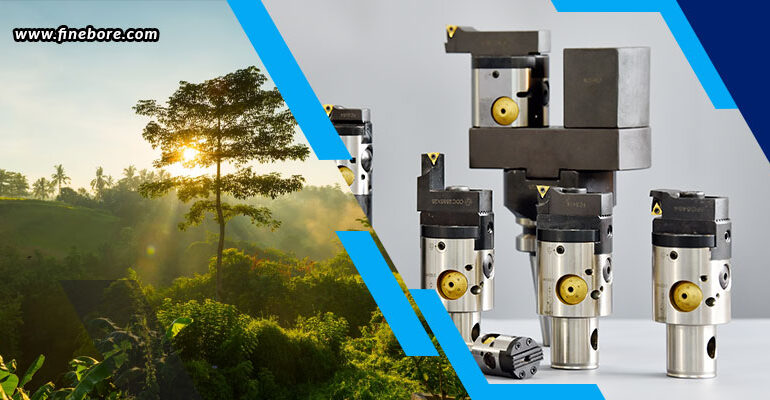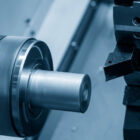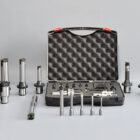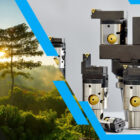Sustainability is becoming increasingly important in the fast-paced world of production. Ceramic, high-speed steel, and carbide are among the materials that are frequently used in boring bars, which are essential in machining processes. But these materials’ effects on the environment need to be carefully considered. This blog thoroughly examines the environmental effect of the materials used to make boring bars, exploring both their manufacturing methods and disposal implications. It also explores sustainable alternatives, looking at advanced composites, bio-based materials, and reclaimed carbide. Manufacturers may encourage greener machining techniques and lessen resource depletion and environmental degradation by investigating these solutions. In the end, this talk aims to encourage a change in machining practices towards environmentally friendly options, creating a more sustainable future for both the industrial sector and the earth.
Environmental impact of traditional boring bar materials
- Carbide – Carbide is a preferred material for boring bars in machining applications because of its remarkable durability and wear resistance. For machinists striving for accuracy and productivity, its resistance to elevated temperatures and retention of cutting-edge sharpness makes it an indispensable option. Carbide undoubtedly has exceptional performance qualities, but also presents ecological concerns that should be carefully considered. Carbide is made by sintering tungsten carbide powder at high temperatures with cobalt acting as a binder. This process produces greenhouse gases and requires a large amount of energy, which increases carbon emissions and pollution of the environment. Moreover, the fact that carbide is made from non-renewable resources—mainly tungsten—raises questions around sustainability and resource depletion.
- High-speed steel – As an alternative to carbide, high-speed steel (HSS) shows promise for excellent performance with relatively less environmental effect. Combining iron, carbon, and other alloying components, HSS offers exceptional toughness and hardness that is appropriate for a wide range of machining applications. Because HSS doesn’t need the lengthy sintering process that carbide requires, less energy is used during manufacture. However, there are still substantial resource consumption and environmental effects associated with the mining and processing of raw materials for the manufacturing of HSS.
- Ceramics – Another alternative for boring bar construction is ceramics, which have outstanding wear resistance, thermal stability, and hardness. Ceramics perform better in abrasive conditions and high-speed machining processes because they are usually based on materials like silicon nitride or alumina. Ceramics are a desired material, but their limited recyclability and energy-intensive production procedures provide issues. High-temperature firing procedures are used in the creation of ceramic materials, which utilize a lot of energy and release greenhouse gases. Ceramics’ brittle nature further complicates recycling efforts due to the need for specialized methods and infrastructure.
There is a need to create environmentally friendly, high-performing substitutes for existing boring bar materials because of the environmental risks they pose. Furthermore, developments in bio-based materials—which come from renewable resources like plant-based polymers—offer the possibility of more environmentally friendly machining techniques. When compared to conventional materials, bio-based materials have a smaller carbon footprint and are more biodegradable, which helps them meet industrial sustainability goals. Additionally, the creation of sophisticated composites offers chances to improve boring bar materials’ sustainability and performance. Advanced composites blend natural fibres like hemp or flax or sustainable fibres like carbon fibre with resin matrices to produce materials that are both lightweight and very durable. These composites have advantages over more conventional materials like carbide or ceramic, including lower production energy consumption and improved recyclability.
In summary, although carbide, high-speed steel, and ceramic are still popular materials for boring bars because of their performance qualities, a move towards more environmentally friendly options is required because of their negative effects on the environment. Utilising innovative composites, bio-based materials, and recovered carbide, manufacturers may lessen their environmental impact while still upholding high levels of productivity and efficiency in their machining processes. Innovation in materials and processes will be essential in constructing a greener and more sustainable future as long as the industrial sector continues to prioritise sustainability.
Sustainable alternatives
The industrial sector is placing a greater emphasis on sustainability, and new materials that may replace conventional boring bar materials could provide effective ways to lessen their negative environmental effects. These substitutes, which include sophisticated composites, bio-based materials, and recovered carbide, provide creative solutions to the environmental issues raised by machining procedures.
- Recycled carbide – One particularly sustainable alternative for boring bar materials is recycled carbide, which has the added advantages of reducing waste and conserving resources. Recycled carbide is made from scrap materials and reclaimed carbide inserts, which reduces the requirement for virgin resources and keeps trash out of landfills. Manufacturers may help promote a circular economy and drastically lessen their environmental impact by utilizing existing carbide resources. Furthermore, recycled carbide preserves virgin carbide’s performance characteristics, guaranteeing steady cutting effectiveness and durability in machining applications.
- Bio-based materials – Another environmentally beneficial option for boring bar construction is to use bio-based materials, which use plant-based polymers’ renewable resources. Bio-based polymers, as opposed to traditional petroleum-based plastics, have a smaller carbon impact and are biodegradable since they are derived from crops like soybeans, maize and sugarcane. Bio-based materials help to reduce reliance on limited resources and mitigate greenhouse gas emissions by substituting materials generated from fossil fuels with renewable alternatives. Furthermore, bio-based materials may be used in a variety of machining applications since they have mechanical qualities that are similar to those of conventional plastics.
- Advanced composites – In boring bar materials, advanced composites provide a state-of-the-art way to combine sustainability and great performance. These composites generate lightweight, high-strength materials by combining natural fibres like hemp or flax or sustainable fibres like carbon fibre with resin matrices. Advanced composites minimize environmental damage while providing better strength, durability, and impact resistance by utilizing renewable fibres and eco-friendly polymers. In addition, the production process for advanced composites usually requires less energy and produces less pollutants as compared to conventional materials like carbide or ceramic.
The use of these newly developed substitutes in boring bar materials is indicative of a larger movement in favour of environmentally friendly production methods. The significance of incorporating environmental factors into their material procurement and production processes is becoming more and more apparent to manufacturers. Through the adoption of innovative composites, bio-based materials, and repurposed carbide, businesses may not only lessen their environmental impact but also improve their brand recognition and competitiveness in an eco-aware market.
To sum up, the development of substitute materials for boring bars offers remarkable prospects to promote sustainability in machining processes. Recycled carbide, bio-based materials, and innovative composites are practical ways to cut back on waste production, lower resource usage, and lessen environmental effect. These substitutes will be crucial in forming a more environmentally friendly and sustainable future for the industrial sector as producers investigate new methods for sustainable machining.
In the industrial sector, addressing the environmental effect of boring bar materials is critical. By embracing eco-friendly techniques and looking into sustainable alternatives, machinists may significantly reduce this effect. FineTech Toolings, a renowned supplier of boring bars in Bangalore, prioritizes environmental stewardship by utilizing cutting-edge technologies and minimizing resource consumption, waste generation, and environmental impact, without sacrificing performance. A more sustainable future in machining is possible when innovation is welcomed and environmental stewardship is given top priority. In this scenario, eco-friendly methods and high-performance standards work together to benefit the world and the machining industry.




